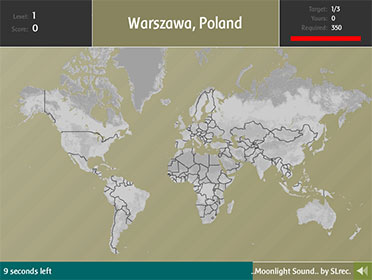Globetrotter XL
Globetrotter XL is a free to play browser game by Manfred Weber of Dschini.org.
What does it teach?
You will learn the location of cities and countries all over the world.
What do you do?
You are given the names of a city and a country and must click on a map before time runs out. The closer you are to the location of the city the more points you get. You also get points for time left, but accuracy is given precedence over speed in the scoring system.
Though this feels inherently more “video gamey” than, for example, World Country Quiz, there’s really nothing intrinsic to the medium in either two games. You could replicate the experience with push pins in a corkboard map, a ruler to measure distance and a stopwatch to time turns. In contrast, fellow simplistic game Tetris owes its existence unconditionally to the computer. That said, Globetrotter XL is undeniably well suited to its medium. It would be much too fiddly and time consuming to play as a board game.
Do you learn anything?
The game sits between the middle and leftmost categories in our game typology. While there is no luck involved if you already know the location of every city in the game, there is an element of luck for most players as cities are randomly picked. In level one, for example, you must pinpoint three cities and reach 350 points to advance to level two. If you are extremely lucky you will be assigned “Belfast, Northern Ireland” three times in a row (the country is easy to identify and so small that any click within its border will give you a near perfect score). If you, on the other hand, are assigned three different, obscure Russian cities, knowing the location of the vast country won’t do you much good.
This is contrary to World Country Quiz, which is a geography game of pure skill. Sure, a novice player will frequently be guessing from the four options given in each turn. But that’s the kind of luck that evens out during a round of 50 turns.
Still, this is predominantly a game about skill in the form of knowledge. The more you learn, the more consistently you will perform well. And as the game rules and mechanics themselves are extremely easy to learn, you are not only motivated to learn geography – you are practically addicted to learn geography. Due to its more systematic approach I would nevertheless choose World Country Quiz for more efficient learning if I was pressed for time facing an exam.
Looking again at our typology, it would be very easy to introduce action game mechanics. Why put push pins on a map when you can throw darts at the map instead? Wouldn’t that enrich the design? No, it would just dilute the game and change the focus from geography to aiming, trajectories, meters and timing. Your incentive to learn geography would drop drastically and the game would still only be a poor substitute for a real game of darts.
Puzzle game mechanics have greater potential. It would perhaps be possible to implement a mechanic that forced you to reflect on how the different locations relate geographically to each other. But you would risk overcomplicating a beautifully simple game. It is remarkable that a game this casual can be this educating. This is mainly due to the scoring system which is satisfactorily discriminating to continue to offer incentive as your knowledge grows and grows.
I recently stated that geography is a subject well suited for rote learning and that rote learning is an activity well suited for gamification. But there is another reason for the quality of geography games: geography is a spatial subject and games excel at spatiality first and foremost – that’s why interactive storytelling is so hard to do.
Pros
Supremely accessible and can be replayed forever as you can always improve your accuracy and timing – even when you have learned all locations by heart. And you will learn.
Cons
Lack of geographical context. Not as substantial and well-structured as World Country Quiz.
Additional information
Globetrotter XL was released in 2009 and is a shameless but well-done copy of TravelPod’s very successful (it even has a Wikipedia entry) flash-game and promotional tool Traveler IQ Challenge (2007) which in turn is more or less a rip-off of Mark Rossen’s DHTML & Ajax game Geosense (2005). But there are almost certainly older precursors. I wouldn’t be surprised if the concept originated in Brøderbund’s Where in the World is Carmen Sandieogo? series (1985-)
The Wall Street Journal Dec. 15, 2007:
“Traveler IQ Challenge was inspired by games played by Luc Levesque, a Canadian programmer and traveler who founded TravelPod. When he was on train trips across Turkey and driving for days to reach remote salt flats in Bolivia, Mr. Levesque, 32 years old, would randomly name a country and one of his travel companions would attempt to name another country or capital city that starts with the third letter of the previous country’s name.”
Sure…
Later clones seems to be a dime a dozen. The GeoGame site, for example, has a big selection of their own variety.
Ola Hansson, 5 November 2014


